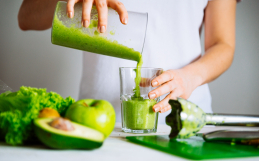Today, we want to engage you in a little debate – a Seed Oil Debate.
Picture this: you’re throwing a quick dinner together; some sort of a pan-fried veggie situation with a protein. You reach over to grab some oil to add to your pan, when you realize you’re faced with two options: canola oil or olive oil. Which do you grab?
If you’re used to eating a Standard American Diet, chances are you’ll grab the former. Canola oil is by far the most popular cooking oil in the States, as it’s marketed as a healthier alternative to animal fats like butter and lard. In fact, canola and similar “vegetable oils” also tend to be the base for vegan butters and spreads. But are seed oils like canola really the healthy alternative they’re meant to be?

To start us off, what actually are seed oils?
Seed oils aren’t much more complicated than they sound. They’re industrial refined vegetable oils that use the seed of the plant and not the fruit. Think canola, corn, soybean, grapeseed, cottonseed, peanut, rice bran, safflower, and sunflower oil.
These industrial oils were created when the industrialization of food was booming (and, not surprisingly, when there was little regulation of the health and safety of food products).
When it comes to seed oils the core problem is the refining process, which involves high heat and pressure and chemical solvents. This style of refining oxidizes the fats in the oil. Fats oxidized by high heat are widely considered to be carcinogenic.
And yet, it’s no surprise that we eat these oils so frequently. They’re cheap and super accessible. Seed oil is typically the most budget-friendly option.
For the same reason, any time you eat out – or even enjoy your favorite snack foods – you’re likely eating seed oil. These oils are used in tons of the foods we eat every day. The pure popularity of them is a huge part of the issue we’re here to discuss. Which leads us to our next point:
Why are seed oils bad for you?
In most of the unsaturated fats we eat, there are two dominant types of fats: omega-3’s and omega-6’s (and we can’t forget omega-9’s, but they’re a slightly different story). Omega-3 fatty acids are your typical doctor-approved anti-inflammatory wonder fat. We get them from foods like olives and olive oil, walnuts, salmon, sardines, and chia seeds.
The issue isn’t with omega-6 fats themselves. Research tells us that we should try our best to maintain around a 2:1 ratio of omega-3’s to omega-6’s for optimal brain health.
The root of the problem is the frequency of consumption of omega-6’s, particularly from chemically-processed sources like seed oils – and most countries lean heavily on seed oils.
Speaking from an American perspective, the average person in the US eats a lot more omega-6 fats than omega-3’s. Seed oils are a common culprit in this imbalance. They’re extremely high in omega-6 fats and many of us consume them every day.
This overconsumption is leading us down a path of inflammation and an increased risk of health issues like heart disease, cancer, and diabetes. Some studies even show that high amounts of omega-6’s may suppress the immune system and actually damage immune cells.
In short, we can all stand to eat a whole lot less of these oils.
Okay, so what do I eat instead of seed oils?
Our favorite alternatives to seed oils are organic olive, avocado, coconut oils, chicken fat, or grass-fed beef tallow. Most of these oils are accessible, affordable, and they’re super versatile to boot!
As we mentioned above, olive oil is a great source of omega-3 fatty acids. We love this oil for medium to lower-heat cooking and baking, but it’s super flexible and can be used for pretty much everything except broiling and frying. It’s also tasty in salad dressings and dips.
Avocado oil is rich in healthy fats, is high-heat stable (broil and fry away!), and has a neutral flavor. This is by far our favorite oil to cook with due to its amazing multitasking abilities.
Coconut oil contains high levels of healthy saturated fats, making it another good choice for high-heat cooking. It’s also rich in medium-chain triglyceride fatty acids that help sustain energy and encourage a healthy metabolism.
Chicken fat or grass-fed beef tallow also have a high smoke point (so perfect for all your high-heat cooking needs). Plus they provide healthy fats, minerals, and tons of flavor.
Wait, does this mean I can’t eat out anymore?
Not at all! You can still eat out and we have some simple tips to help you navigate restaurants sans seed oil:
- Use an app or website to help you search for restaurants in your area that don’t use seed oils. We love Seed Oil Scout, an app you can download on your phone. Websites like Local Fats and Seed Oil Free Restaurants are also great resources.
- Approach seed oil-navigation like you would an allergy. For example, when we go out to eat we ask the server what oil a dish is cooked in. Restaurants often have alternatives like olive or avocado oil in their kitchens, so you can request they cook your food in that oil instead.
Another important tip for avoiding stealthy seed oils is to become a label detective. Read through all the ingredients on your foods, because seed oils show up in places you’d never expect.
Non-dairy milks are a huge culprit, so make sure you pay extra special attention to those labels. Many non-dairy milks contain sunflower oil because the fat helps with emulsion and a smoother, more appealing final texture (particularly in barista milks). We love the brand Malk for an organic, seed-oil free option.
These days, brands are getting better at prioritizing non-seed oils and labeling their products to indicate when they’re seed oil-free. For example, we love Siete Foods and Lesser Evil snacks because both companies use other oils in place of seed oils.
The less popular seed oils become, the more options there will be! So get out there, start reading labels, and request alternatives at your favorite restaurants.
It may seem small, but making this one shift will make a huge difference in your health. You’ll experience less inflammation, and your doctor will rave about your bloodwork.
With heart-healthy hugs,
The Conscious Cleanse Team
If you liked learning more about seed oils, we invite you to join our online community! When you sign up you’ll receive regular healthy lifestyle tips and new recipes. As a welcome-gift we’ll send you our Green Smoothie eCookbook, a collection of more of our favorite easy, inflammation-busting smoothie recipes!
Welcome! We’re so glad you’re here.







I’ve only seen olive and coconut oil in vegan butter. Which one has canola oil in it?
Hi Kathy, thanks for your comment! This is a great question — there are several brands on the market that contain canola oil. Some popular brands that contain canola oil are Violife, Earth Balance, and Naturli. It’s also worth noting that almost all plant-based butters on the market contain sunflower or soybean oil, so limiting how often you use them or using homemade alternatives can help reduce your intake of seed oils. Feel free to reach out to us directly if you have any more questions about vegan butters at connect@consciouscleanse.com! XO, The Conscious Cleanse Team.